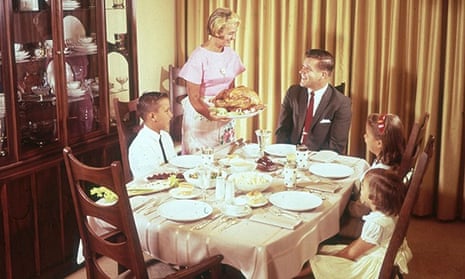Thanksgiving is a holiday of hidden meanings. It pretends to be about mutual respect, specifically that between the settlers and the indigenous people of North America. But of course you can only sincerely celebrate that if you ignore the way the former subsequently killed off large swaths of the latter. Similarly, the sweet experience of family togetherness promised by the holiday is a lie, for most people. Get stuck in a room with your family and, well, even family love is a battlefield.
I have, therefore, books to recommend both as psychic preparation and coping mechanism for the holiday. These books are mostly about families, unconventional ones. To read them is to feel the satisfying superiority of one who knows that things could always be worse.
You might, for example, belong to the kind of family where money and finances are a recurring theme in holiday arguments. If so, trundle over to your old schoolbooks and pick up Thomas Hardy’s Jude the Obscure again. This one is even suitable for reading aloud in the midst of arguments. Jude Fawley’s inability to support his offspring, and the consequent misery he inflicts on Sue, forms a useful shield for the modern financially-precarious child. The mere contrast between Jude and Sue’s situation and your own should convince parents that low contributions to a 401(k) plan are not tantamount to catastrophe. And, should there be a surprise on the way, you can point out that we no longer live in the 19th century where children out of wedlock will make you a social pariah. (Arabella really was kind of right when she told Sue to marry Jude because “[l]ife with a man is more businesslike after it.”)
Family arguments about money may give rise to certain fantasies of how unlimited resources could allow you to live in harmony. Nonfiction is best at divesting yourself of this lie. Mommie Dearest by Christina Crawford, is a swift corrective to that end. Joan Crawford only let her wear two of all the pretty dresses she bought! But a copy of Crawford’s bestselling classic can now be hard to come by. So I’d pair this with a perusal of Bill Dedman and Paul Clark Newell Jr’s recent Empty Mansions: The Mysterious Life of Huguette Clark and the Spending of a Great American Fortune. Clark’s story just goes to show you that the promise of a huge inheritance will not keep you from dying alone. Moreover, owning several mansions while doing it will just make you suspicious that everyone wants your money, which let’s face it, they probably do.
Some people’s families come closer to the edge of outright violence. Good news: there is a wealth of good literature which will remind you how sane and normal you are even if voices get raised. Consider Shirley Jackson’s We Have Always Lived in the Castle. The family at issue numbers only three, the survivors of a family arsenic poisoning. Their story is narrated by Merricat, the younger of two surviving sisters. Constance, the elder, is widely rumored to have put the arsenic in the family sugar bowl. There is regular allusion to a table which their Uncle Julian admits “is overlarge now for the pitiful remnant of our family.” By the time you learn exactly what happened with the arsenic you will be intrigued by the intrafamilial dynamic here but also grateful that your own is more straightforward.
If you prefer nonfiction there is also a recent biography of Charles Manson to peruse. Of course, he wasn’t a conventional patriarch. But Jeff Guinn’s Manson: The Life and Times of Charles Manson will at least shatter your illusion that most people, given the option, would choose a better family for themselves than the one they are born in. No quirks of your family will seem quite as irritating when laid side by side with the Mansons’. Even setting aside the gruesome murder thing, Guinn details sobering family rules like Manson’s firm prohibition of the use of eye-glasses. Although it can always be hard to perceive things clearly in family settings, there is something dreadfully direct about such a rule against seeing.
And if all these families are not catastrophic enough with you, if you still need further levels of interior and exterior violence to get a handle on your own situation, there is always Lionel Shriver’s We Need to Talk About Kevin. The mother-of-a-school-shooter tale is a kind of early-aughts bogeyman. But Shriver’s made it all the more upsetting by portraying the process of raising such a kid as a tug-of war between reluctant mother and off-kilter son. The book is unrelentingly bleak, copping to misery early on: “one of our first sacrifices to family life was lightness of heart.” Every bit of family fun in that book is portrayed as self-delusion even before the tragedy. Which, if nothing else, will leave you grateful for every small, sincere laugh you might have while stuck with your own family over the holiday.

Comments (…)
Sign in or create your Guardian account to join the discussion